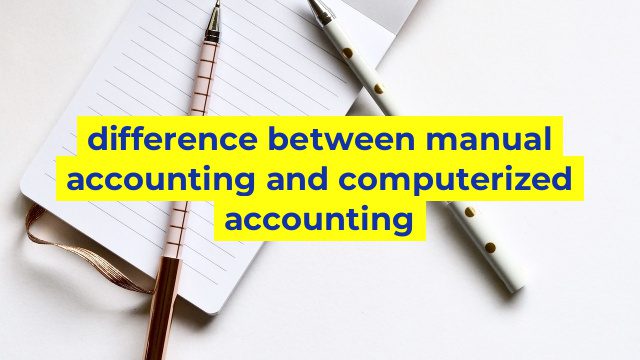The Difference between Manual and Computerized Accounting
Manual Accounting
Manual accounting processes refer to traditional methods of bookkeeping where financial records are recorded by hand, using pen and paper or ledgers. Manual accounting is a time-consuming process that requires a great deal of attention to detail as all account entries are recorded by hand. Additionally, this method can lead to potential inaccuracies and errors and so requires significant double-checking to ensure records are correct. It is also difficult to analyze data and extract insights.
However, manual accounting typically doesn’t require any expensive software or technical expertise, making it cost-effective for small businesses or businesses that don’t have a high volume of transactions.
Computerized Accounting
Computerized accounting uses specialized software to record financial transactions and generate reports. The software can be customized to meet the specific needs of different businesses, and is designed to simplify the process of managing financial records.
With computerized accounting, data entry is faster and more accurate, as the software automatically calculates and records transactions. Additionally, you can generate real-time reports based on the data that is being recorded, making it easier to analyze and monitor business performance. It also makes it easier to manage the accounting data on a large scale, which is essential for businesses with larger volumes of transactions or more complex financial affairs.
However, computerized accounting does require a certain level of technical skills and knowledge, and it can also be more costly than manual accounting.
Which is Better?
Ultimately, the choice between manual and computerized accounting depends on the needs of the business. Manual accounting is appropriate for small businesses with a limited number of transactions, while computerized accounting is better suited for larger businesses or those that require more complex financial management.
In general, computerized accounting is more recommended because it increases accuracy, allows for easier analysis and monitoring, and increases efficiency. While the initial investment might be higher than manual accounting, the long-term benefits can outweigh the costs.
Conclusion
Manual and computerized accounting have their respective advantages and disadvantages. While manual accounting is cost-effective, it is labor-intensive and prone to errors. Conversely, computerized accounting promotes accuracy, increased efficiency and allows for easier analysis but requires a higher technical skillset and can be expensive.
Ultimately, businesses must decide which method is best suited to meeting the specific needs of their organization based on their budget, complexity, industry and transaction volume.
Table difference between manual accounting and computerized accounting
| Aspect | Manual Accounting | Computerized Accounting |
|---|---|---|
| Cost | Low startup cost | Higher startup cost due to software and hardware requirements |
| Accuracy | Prone to human error | Less prone to human error due to automation |
| Speed | Slower due to manual entry and calculations | Faster due to automated data entry and calculations |
| Storage | More physical space required for paper records | Less physical space required due to digital storage |
| Accessibility | Information can only be accessed from physical records | Information can be accessed from anywhere with internet connection |
| User-Friendliness | Requires extensive accounting knowledge and training | Easy to use for individuals with basic computer skills |
| Flexibility | Less flexible and customizable | More flexible and customizable due to software options |


